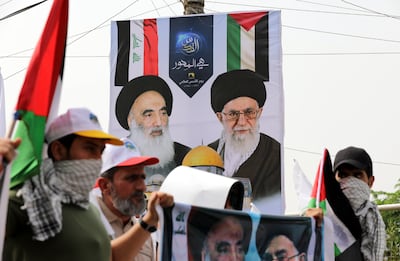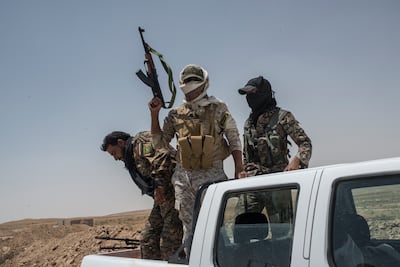Live updates: Follow the latest news on Israel-Palestine
Masked and fully equipped fighters of the Asaib Ahl Al Haq militia, one of the powerful Iran-backed armed groups in Iraq, lined up in rows next to camouflage pickup trucks adorned with Palestinian flags.
“Oh people of Al Quds, we will fold the land like folding the papers to catch up with your resilient caravan,” one fighter said before the camera, using a metaphor for moving fast.
“We offer our support with our souls and equipment, we are ready and not mere bystanders,” he added, putting his finger on the trigger of his machinegun.
As tension escalates between Israelis and Palestinians in Gaza with the bloody confrontation entering its fifth day on Wednesday, Iran’s allies in Iraq are using the opportunity to assert themselves and show their strength.
As part of the so-called Axis of Resistance – a Tehran-backed network that encompasses militant groups in Palestine, Iraq, Hezbollah in Lebanon and the Syrian government – they have warned the US they will attack its bases and troops if it chooses to directly intervene in the ongoing war.
“Our stance is clear, and the Americans have to understand it, if they intervene, we will intervene,” the head of the Badr Organisation, which has an influential militia, told tribesmen on Monday in Baghdad.
The Badr Organisation was formed in Iran during the Iran-Iraq war.
“If the Americans intervene openly in this conflict, we will consider all American targets legitimate and we will not hesitate to target them,” said Hadi Al Amiri, who also heads the Fatah Alliance, a leading component of the Iran-backed Co-ordination Framework, which is now the largest bloc in parliament.
On Saturday, Hamas militants in Gaza launched Operation Al Aqsa Flood, the biggest attack on Israel in years. The surprise assault involved gunmen crossing the border from Gaza under a heavy barrage of rockets from the Palestinian enclave.
The attacks spurred Israel to launch large-scale retaliation against Hamas in Gaza. As of early Wednesday, the combined death toll exceeded 2,000 – 900 in Gaza and 1,200 in Israel, with thousands more injured.
Since Saturday, heavily armed fighters linked to powerful militias have been parading the streets and holding demonstrations in a show of force.
Along with the Badr Organisation, other influential Shiite militias Kataib Hezbollah, Hezbollah Harakat Al Nujabaa and Kata'ib Sayyid Al Shuhada issued the same warning. Analysts say many of the groups are armed and trained by Iran, to varying extents.
Those make up the backbone of the state paramilitary organisation known as the Popular Mobilisation Forces.

The PMF has also voiced its "unequivocal support" for the Palestinian factions and the Iraqi government has said the Palestinian operations were a natural outcome of what it calls oppressive policies by Israel.
“Our drones, missiles and special forces are on high alert to launch precision strikes against the American enemy at their bases and disrupt their interests,” a militia leader told The National.
Asked whether they will act alone or in consultation with Iran, he said: “We are part of the Axis of Resistance, which is led by Iran, so it will be their call and we have to co-ordinate with them.
"This is not something new for us, we did attack US troops and Israeli interests before," he added, referring to numerous attacks against US troops and embassy in Baghdad and Kurdistan which Iran accused of harbouring Israeli intelligence agents.
On Tuesday, Asa'ib Ahl al-Haq said its leader, Qais Al Khazali, phoned Hamas political chief Ismail Haniyeh. Mr Al Khazali reiterated that “the factions are fully prepared for any required action”, according to a statement.

Mr Haniyeh was supposed to visit Baghdad on Saturday as part of a regional trip, a legislator and government official close to the PMF told The National. But the visit was postponed after declaring the attack.
The PMF warnings were also echoed in Yemen where the leader of the powerful Houthi Movement warned on Tuesday that the group would respond to any US intervention in Gaza with drones, missiles and other military options.
He said the group was ready to co-ordinate intervention with other members of the Axis of Resistance. Lebanon's Hezbollah group has already entered the fray, firing rockets and exchanging fire with Israel at the border.
In remarks from the White House on Tuesday, US President Joe Biden said the US stands with Israel, confirming continued support for the country.
"In this moment, we must be crystal clear: We stand with Israel," Mr Biden said.
"We will make sure Israel has what it needs to take care of its citizens to defend itself [and] respond to this attack. There's no justification for terrorism. There's no excuse," he added.
The US military has sent an aircraft carrier strike group to the Eastern Mediterranean, a move that often follows global crises where US interests are seen as threatened.
It is still unclear to what extend the Iraqi Shiite militias are willing to act on their threats inside Iraq, where several hundred US forces are based, training Iraqi soldiers.
Analysts say the PMF, however, enjoys full support from Prime Minister Mohammed Shia Al Suhani's government, which in turn is trying to maintain warm relations with Washington.
Michael Knights, a fellow at the Washington Institute focused on security in Iraq, said Iran and its proxies “are just posturing and trying to show support to Hamas”.
“As a result, Iraqi militia leaders can make bold statements and visit the Israeli border without taking any real risks,” Mr Knights told The National.
AAH leader Mr Al Khazali visited the Lebanon border in 2017 to tour Hezbollah positions.
The reality is that Hamas has shown itself to be a more valuable, capable, and trusted partner than the Iraqi militias, given their differences, he added.
“The order of importance for Iran is Lebanese Hezbollah first, then the Houthis, then Hamas, and last of all the Iraqis,” he said.
“This is why Iraqi militia leaders are desperate to get involved in the Gaza crisis, albeit without helping or taking any risks in reality,” he said.


